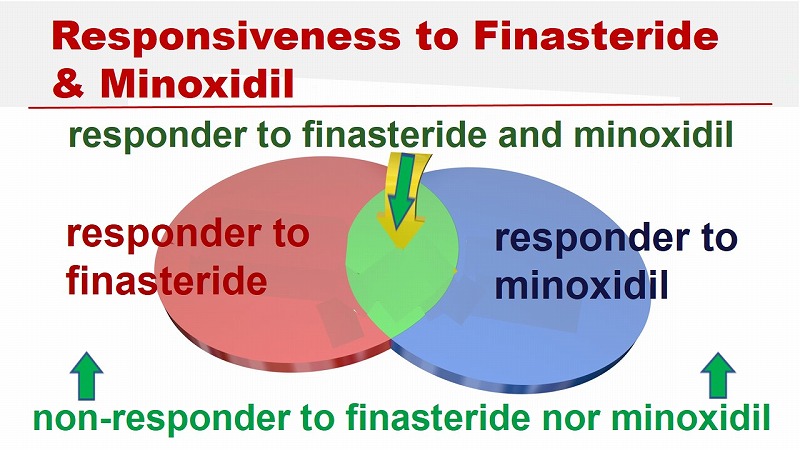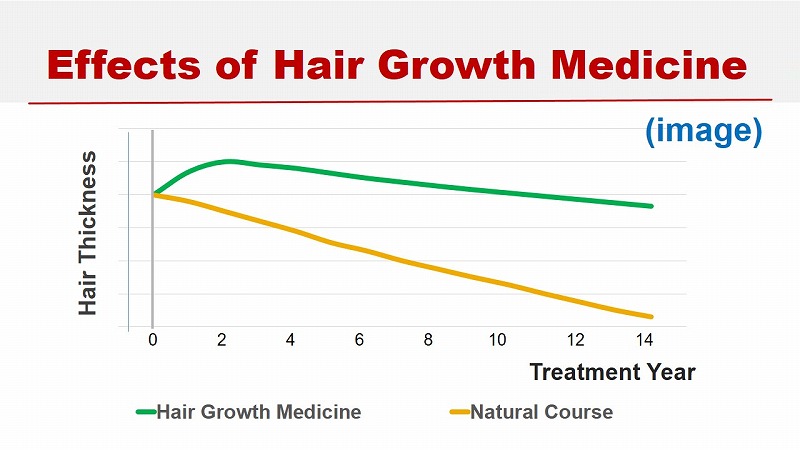Responsiveness to Finasteride and Minoxidil

There are certain people who respond well to both finasteride and minoxidil.
They are lucky patients who can expect a satisfactory hair density increase with medical treatment for hair loss using a combination of finasteride and minoxidil. They may be able to enjoy a synergistic effect between two of these drugs.
Most of the other people respond to either finasteride or minoxidil to some extent.
They will also be able to enjoy an increase in hair density in the vertex and central areas, for example, by medical treatment.
They are also responders to the hair regrowth treatment. Hair thickness will be maintained with the continued use of the medicines thereafter.
There are some people in whom hair thickness does not seem to increase even after medical treatment. They usually tend to think of themselves as non-responders to the drugs.
However, even if someone does not recognize the increase in hair thickness with hair regrowth medicines, it does not necessarily mean that the person does not respond to the treatment.
Since the increase in hair thickness progresses slowly in one year, someone may not realize the small change in hair density.
The natural thinning of hair may be delayed to some extent, and current hair thickness may be maintained with hair growth drugs even in so called non-responsive people. These results also mean that hair regrowth treatments are working effectively in these people in the author’s opinion.
The number of true non-responders is not so large according to the author’s experiences.
It is very important to maintain the current hair thickness by using hair growth medicine.
The maintenance of current scalp hair is the ultimate goal of hair growth treatment.
The author would like to encourage people to keep using hair regrowth drugs, even if they may feel that the drug does not work effectively for them.
Effects of Hair Growth Medicine

Hair thickness will increase by using effective hair regrowth medicine.
A GREREN LINE:
Hair density increases to the maximum after 1-2 years of the treatment with hair growth medicine in responders. After that, the effect of the drugs peaks out and changes to a maintenance stage in which hair thickness decreases slightly with age. (a green line)
Increased density of hair is a story only in the first 1-2 years. Hair thickness will not continue to increase indefinitely by medical treatment even in the responders.
It may seem that the hair density does not increase after the period, but the hair thickness will be maintained as long as hair growth medicine is continued.
The progression of hair thinning is a fate programmed by the genes. Hair thickness decreases slightly with age. However, it will be possible to maintain hair density to some extent by continuing the hair regrowth treatment.
Some people believe that the hair growth products are no longer effective and search for a stronger hair regrowth drug. However, there is no drug that will keep you growing thicker hair forever.
It is of utmost importance to maintain the existing hair. Maintenance of existing hair thickness is the ultimate goal of the hair regrowth treatment in the author’s opinion.
A YELLOW LINE:
When people do not use hair regrowth medicine or stop using medications for any reason, their hair becomes thinner with age, depending on the natural progression of androgenetic alopecia. This is the worst scenario. (a yellow line)
No one can stop thinning of hair with age. Only God can make it.
However, we can slow the natural progression of hair thinning. It is the effect of hair growth drugs in the author’s opinion.
Small changes in daily life can make a big difference in the long run.
Effects of High-Dose Finasteride
What about the dose of Finasteride?

According to the author’s clinical experiences, the ratio of responders to a daily dose of 1mg of finasteride was about 40% of the population. Hair thickened with standard doses of finasteride in these patients.
In the other 60% of the population, hair thickness did not increase subjectively with 1mg of finasteride per day. They were considered to be non-responders to standard dose of finasteride.
The author has prescribed 3.5mg daily finasteride for one year to 10 patients, who did not have any increase in hair thickness with 1mg of finasteride per day.
After one year, there was a significant increase in hair thickness in 4 of the 10 patients, although there was no noticeable change in hair thickness in the other 6 patients.
This result suggests that hair thickness increased in approximately 40% of non-responders by taking high-dose of finasteride, even though they did not increase hair thickness with a standard daily dose of finasteride (unpublished personal data).
This means that the hair thickness increased in about 64% (2/3) of the population that sums the responders to standard dose and high doses of finasteride.
It also means that there was no increase in hair thickness in about 1/3 of the population with finasteride therapy.
Since the therapeutic dose of finasteride is 5mg per day in elderly men with prostatic hypertrophy, finasteride of 2-3 mg per day can also be safe for young people.











